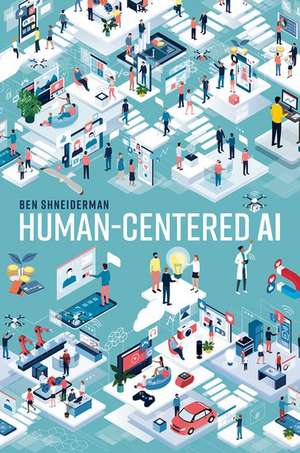Human-Centered AI
Autor Ben Shneidermanen Limba Engleză Hardback – 13 ian 2022
The remarkable progress in algorithms for machine and deep learning have opened the doors to new opportunities, and some dark possibilities. However, a bright future awaits those who build on their working methods by including HCAI strategies of design and testing. As many technology companies and thought leaders have argued, the goal is not to replace people, but to empower them by making design choices that give humans control over technology.In Human-Centered AI, Professor Ben Shneiderman offers an optimistic realist's guide to how artificial intelligence can be used to augment and enhance humans' lives. This project bridges the gap between ethical considerations and practical realities to offer a road map for successful, reliable systems. Digital cameras, communications services, and navigation apps are just the beginning. Shneiderman shows how future applications will support health and wellness, improve education,accelerate business, and connect people in reliable, safe, and trustworthy ways that respect human values, rights, justice, and dignity.
| Toate formatele și edițiile | Preț | Express |
|---|---|---|
| Paperback (1) | 92.12 lei 10-16 zile | +31.34 lei 4-10 zile |
| OUP OXFORD – 20 mar 2025 | 92.12 lei 10-16 zile | +31.34 lei 4-10 zile |
| Hardback (1) | 164.30 lei 3-5 săpt. | |
| OUP OXFORD – 13 ian 2022 | 164.30 lei 3-5 săpt. |
Preț: 164.30 lei
Preț vechi: 205.38 lei
-20% Nou
31.44€ • 34.14$ • 26.41£
Carte disponibilă
Livrare economică 01-15 aprilie
Specificații
ISBN-10: 0192845292
Pagini: 400
Ilustrații: 26 colour illustrations
Dimensiuni: 162 x 240 x 25 mm
Greutate: 0.83 kg
Editura: OUP OXFORD
Colecția OUP Oxford
Locul publicării:Oxford, United Kingdom
Recenzii
does a great job in promoting HCAI, putting human and societal needs center stage in the design and application of AI, and in presenting and discussing several very practical ideas
Your new book, Human-Centered AI, is the most balanced, pragmatic and optimistic analysis of artificial intelligence that I've read. You lay out a comprehensive guide to building reliable, safe, and trustworthy applications that feature both high levels of human control and high levels of automation. A critical part of your argument is that if we want to achieve a flourishing and humane future it's essential for us to understand that computers are not in fact people, and vice versa.
The authors approach could not be more important as a moral and normative position on the development of the field, and should be taken as a starting point for public policy discussion... the book is essential reading and its fundamental argument constitutes a moral imperative.
A focus on developing AI that helps people will dissolve much of the fear of lost jobs and machine control... Few books on AI discuss the importance to good design of applying the right sort of pressure to the corporate owners of AI systems to push them into social fairness. This one does.
This book combines persuasive arguments with catchy lists and phrases it also is meticulously researched with extensive citations and well-written for a broad audience , HCI News
This expert believes we can create AI systems that can have both high levels of automation and human control... Shneiderman provides guidelines covering visual design, previews of expected actions, audit trails, near-miss and failure reviews, and others that can help ensure reliability, safety, and trustworthiness. Basically, by acknowledging the limits of both human and artificial intelligence, designers and developers of automated products can find the right division of labor between humans and AI.
the book [is] especially relevant to AI researchers and developers...Expanding the variety of inputs into AI design will be essential to achieving Shneiderman's transformative vision of a more human-and humane-future.
The book is well-structured and a delight to read. The coverage is comprehensive. But it will be controversial. AI scientists and engineers, and anyone concerned about the scientific, social, ethical, legal or philosophical impacts of AI should engage with the theses of Human-Centered AI, even if it is to contest them at times.
From design metaphors to the much needed governance structures, this new book by Ben Shneiderman is a tour de force into the increasingly important topic of human-centred AI. Going beyond the many benefits and dark possibilities, the book provides a fresh vision of AI as a supertool for human wellbeing. A must read.
Intellectually re-positioning the practice of AI is the most important social movement of our age. Human-Centered AI is a moral imperative. The graveyard of AI products is replete with well-intended systems centered on the technology. Don't make the same mistake—adopt an HCAI mindset.
A critical call for AI to be human-centered...offers insightful lessons and practical takeaways.
Human-Centered AI makes a case for AI systems that amplify and extend human abilities and performance.
Shneiderman's book is a valuable resource for those shaping the future of design. By keeping human creativity at the forefront, advancements can be leveraged in balanced ways to create new, interesting, and impactful work.
Notă biografică
Ben Shneiderman is an emeritus distinguished university professor in the Department of Computer Science at the University of Maryland. His widely used contributions include clickable highlighted weblinks, high-precision touchscreen keyboards for mobile devices, and tagging for photos. Shneiderman's information visualization innovations include dynamic query sliders for Spotfire, development of treemaps for viewing hierarchical data, novel networkvisualizations for NodeXL, and event sequence analysis for electronic health records. Shneiderman is also the Founding Director (1983-2000) of the Human-Computer Interaction Laboratory, and a member of the UM Institute for Advanced Computer Studies (UMIACS) at the University of Maryland. He is a Fellow of the AAAS, ACM,IEEE, NAI, and the Visualization Academy and a Member of the US National Academy of Engineering, in recognition of his pioneering contributions to human-computer interaction and information visualization.
